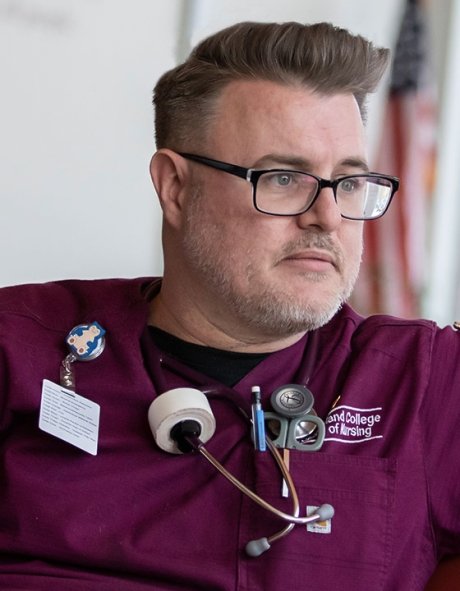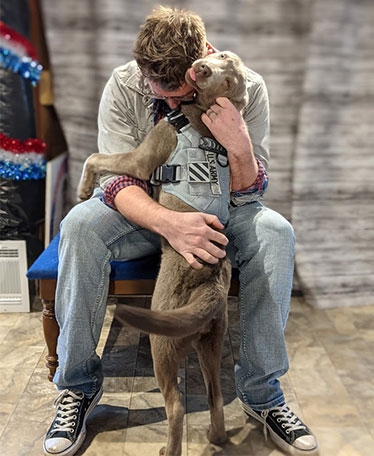MEET OUR GRADUATES: Former Combat Medic Earns Degree in Nursing
- News & Events
- News
- MEET OUR GRADUATES: Former Combat Medic Earns Degree in Nursing

“As a combat medic, I was the authority on my squad, but I won’t be that as a nurse. Nursing is more team centered, and, at RIC, caring is a culture,” says Sgt. David Fields.
While deployed in Bagdad, Iraq, as an Army combat medic during Operation Iraqi Freedom, Sgt. David Fields was known as “doc.” He cherishes that title as a badge of honor.
“In the military, being called ‘doc’ means that you elicited trust from the people you were caring for,” says Fields, who was only 24 when he served. “In Bagdad, I enjoyed being the point person and caretaker for infantry soldiers who needed someone to talk to and to teach them how to take care of themselves in that environment. A good combat medic accepts everyone for who they are in the moment. You’re there to give soldiers the opportunity to be vulnerable without being weak.”
Fields also cared for Iraqi locals affected by the war. He taught combat life-saving courses to troops that included tasks such as tying tourniquets on wounds, dispensing fluids and diagnosing heat strokes.
A recipient of numerous Army commendation medals, Fields also developed and led health education and service programs to help Iraqi locals construct Army-run medical clinics, improving access to healthcare in rural areas.
“It was rewarding to know I helped somebody and was able to teach people to help themselves,” he says. “I thank the military for that opportunity. I got a chance to do bigger things at age 24 than I would have ever been able to do anywhere else.”

After returning to the United States from back-to-back tours in Iraq, Fields waged a war with another adversary – alcohol.
“Because I was on the Army’s Inactive Ready Reserve status and not a part of any National Guard, there weren’t any parties, parades or people knocking on my door to come to the Veterans Administration to get help,” he says. “I didn’t have anywhere to go to vent, and it started to affect my life in negative ways. I used to blame the military, but the truth is I blame myself because I turned to alcohol. I had an issue with it, and that kept me from getting the help that was available.”
During that time, Fields was living in Chicago and making his mark in a sales and marketing career that he says only fueled his struggle with alcoholism, despite the help offered to him by family and friends.
“After more than a decade of alcoholism, I returned to Rhode Island at my family’s urging,” Fields says. “On April 4, 2018, I woke up and that was the last day I drank alcohol. I stopped because I realized that if I didn’t do something I was going to either be in jail or die.”
Fields says he credits his higher power and his AA sponsor for guiding him toward new personal and professional pursuits.
“My sponsor asked me when I felt the happiest in my life. It turns out that it was when I was in Iraq as a combat medic,” Fields says.
After going to the Veterans Administration, Fields secured Veteran Readiness and Employment benefits designed to retrain military personnel and help them access employment and educational opportunities. He took aptitude tests that confirmed that he was best suited for nursing.
On the cusp of graduating with a bachelor’s degree in nursing, Fields is hoping to establish the same rapport he had with military service members with a different population – the elderly. He minored in gerontology and is this year’s recipient of RIC’s Harold Sweet Award, which recognizes outstanding contributions and excellence in the study of aging.
Less than one percent of registered nurses are certified in geriatrics, according to the American Geriatric Society, so Fields’ presence will help to fill a major void.
“I feel like I have a special knack with senior citizens,” says Fields, now age 43. “I have a close relationship with the elderly women in my family, especially my nana, who is in her 80s now. I strive to treat people the way I treat her. I have the care and capacity to make a difference in geriatrics, and I want to do so as a nurse practitioner in geriatrics mental health.”
Fields anticipates the nursing field will be an adventure.
“As a combat medic, I was the authority on my squad, but I won’t be that as a nurse,” he says. “Nursing is more team centered, and, at RIC, caring is a culture. The nursing students, alumni and professors are all part of a family who care about each other. We have a reputation for being some of the best nursing students in a clinical environment in the state.”
Fields also paid homage to the college’s Military Resource Center for keeping him on track.
“One of my military disabilities is major depressive disorder brought on by combat,” he says. “The people who have reached out to get me off the couch at times are the people in that center. As a veteran student and an older student, they can understand what I and others are going through.”
Fields also acknowledged that his advisor RIC Assistant Professor of Nursing Sheri Boucher helped him grow academically and personally. A veteran Air Force lieutenant colonel, Boucher exclusively advises military veterans in RIC’s nursing program, conducting monthly meetings to promote inter-student mentorship among veteran nursing students.
“Boucher’s intervention helped me regain focus on my studies and navigate my personal challenges effectively,” Fields says. “Her approach to advising goes beyond academic guidance. Her dedication, empathy and professional acumen make her not just an advisor but a pillar of strength and inspiration for students like me.”
Boucher says she met Fields when he was a student at CCRI and advised him to transfer to RIC. She was struck by his life experience, which she says will serve him well as he launches his career in gerontology.
“David is well-aligned to work with seniors,” she says. “I believe they will have a great appreciation for his sense of humor as well as his excellent care.”
